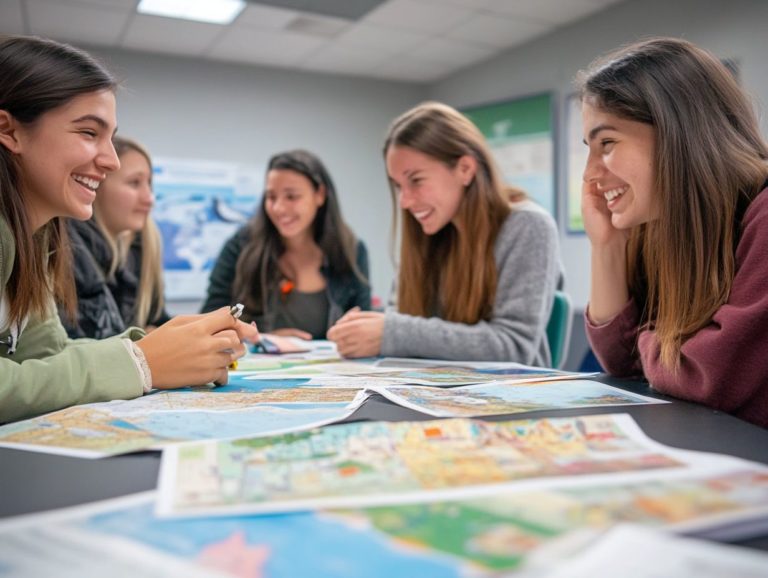What are the Most Common Study Abroad Questions?
Studying abroad is an amazing chance to gain a world-class education while immersing yourself in new cultural experiences that broaden your perspective and enhance your personal growth.
Whether you opt for Germany, Canada, Australia, or Norway, the advantages extend well beyond academics. You’ll benefit from language assistance, community engagement, and invaluable insights into the global job market, making you a more competitive candidate in your career pursuits.
Scholarships can ease the financial burden associated with these transformative experiences, making them accessible for many students.
Engaging with diverse cultures fosters adaptability, a vital skill in our interconnected world. International education equips you with the ability to navigate cultural nuances and communicate effectively with people from various backgrounds.
This adaptability enriches your personal interactions and proves essential in professional environments, where employers increasingly seek candidates who can thrive in multicultural teams.
By leveraging scholarships, you can alleviate financial stress and fully embrace these enriching experiences. The opportunities for personal growth, networking, and developing a global perspective that come with studying abroad can significantly shape your future career path.
Contents
What to Consider Before Studying Abroad
Before you embark on your study abroad journey, it s essential to reflect on several factors that can shape your experience. Consider accommodations that align with your lifestyle, the cost of living in your chosen destination, and a healthcare plan that ensures your well-being throughout your stay.
Understanding the visa application process the steps you need to follow to get permission to study in another country can save you both time and stress. Gathering all necessary documentation well in advance is crucial.
Researching living expenses is equally important; it aids in budgeting and facilitates better financial planning. Exploring available financial aid options can ease some of the financial burdens and make your experience more manageable.
When choosing accommodations, think about your proximity to public transport and campus facilities, as this will significantly enhance your daily routine. Familiarizing yourself with the local healthcare system is crucial; knowing where to seek medical assistance can be invaluable when navigating unfamiliar territory.
Preparing for Study Abroad
Preparing for study abroad entails a series of essential steps to ensure a seamless transition into a new academic environment. You’ll need to understand the application process, secure appropriate student housing, and engage in orientation activities that will help you feel more at home in a foreign country.
Careful planning is necessary for the application process, especially concerning deadlines for submitting documents and obtaining your student visa.
Thorough research into housing options is crucial; it allows you to find the ideal fit for your needs, ensuring that your experience abroad is both enriching and comfortable.
Key Takeaways:

- Studying abroad offers valuable opportunities for personal and academic growth.
- Before studying abroad, consider factors such as program choice and the application process.
- Financing study abroad can be made easier through scholarship opportunities and effective budgeting.
Start your journey today and explore the incredible benefits of studying abroad!
Choosing a Program
Choosing the right study abroad program is an important decision that can greatly influence your academic path and personal development. It s wise to consult with an academic advisor who can assist you in navigating your options and ensuring they align with your career aspirations.
To embark on a rewarding experience, take the time to research various universities and their unique offerings. Each institution possesses distinct strengths, programs, and cultural environments that can significantly impact your educational journey.
Comparing curricula, faculty interests, and extracurricular opportunities is essential before making your choice.
Connecting with academic advisors is crucial, as they can provide tailored guidance to your individual goals and interests, empowering you to make informed decisions that align with your future aspirations.
Application Process

Navigating the application process for studying abroad can feel like piecing together a complex puzzle. You will have multiple steps to tackle securing scholarships, completing the visa application, and gathering all necessary documentation to ensure a seamless transition to your host country.
To kick things off, explore various scholarship opportunities that align with your academic aspirations. Many institutions offer financial aid specifically tailored for international students, and finding the right one can significantly ease your financial burden.
Once you have your funding secured, it s time to focus on the visa application. This step requires meticulous attention to detail, including proof of enrollment, evidence of financial stability, and medical insurance documentation (which shows that you are covered for health costs while abroad). Familiarizing yourself with the specific requirements and timelines set by the consulate of your target country is crucial to avoid any unwelcome delays.
Don t forget to prioritize gathering essential documents like transcripts and letters of recommendation to streamline the process. By staying organized and proactive, you can confidently navigate each stage of this journey, transforming this challenge into an exciting journey!
Financing Study Abroad
Financing your study abroad experience is a crucial element of your planning process. It requires a comprehensive understanding of tuition fees, available scholarships, and budgeting for living expenses.
Explore financial aid options to lessen your costs, allowing you to focus more on your studies and the adventure ahead.
Scholarship Opportunities
Scholarship opportunities are essential for making study abroad a reality for many international students. They provide financial aid that can cover tuition fees, living expenses, and other costs associated with studying in a foreign country.
These financial assistance options come in various forms. Merit-based scholarships reward academic achievements, while need-based scholarships assist students with financial challenges.
Additionally, there are country-specific or program-specific scholarships available. Be sure to explore resources such as university websites, scholarship search engines, and educational organizations dedicated to enhancing study abroad experiences.
Keep in mind that eligibility criteria can vary widely, often focusing on academic achievements, field of study, or even community service.
To strengthen your applications, craft compelling essays that showcase your aspirations and unique qualities, ensuring your clarity and passion shine through. Additionally, make it a point to meticulously track application deadlines so you don’t miss out on valuable opportunities.
Don’t wait! Begin exploring your study abroad options today!
Budgeting and Managing Expenses
Effective budgeting and managing expenses are essential for ensuring a successful study abroad experience. This involves careful planning of your living costs and a clear understanding of the overall cost of living in your chosen destination.
To navigate these financial waters with confidence, begin by outlining key areas such as tuition fees, accommodation, food, and transportation. Conduct thorough research on local living costs to set realistic expectations.
Creating a monthly spreadsheet to track your expenditures can be particularly beneficial, allowing you to keep unnecessary spending in check.
Exploring various financial aid options like scholarships or student loans can significantly ease monetary strain, enabling you to focus on making the most of your academic journey abroad. By prioritizing your needs and diligently monitoring your finances, you can fully embrace your adventure while maintaining financial stability.
Living and Adjusting to a New Culture
Living and adapting to a new culture can be one of the most enriching yet challenging experiences you ll encounter while studying abroad. You ll find yourself navigating cultural differences, seeking out language assistance, and immersing yourself in the community.
Stay mindful of safety measures in your new environment.
Cultural Differences and Challenges

Cultural differences can present a range of challenges as you adapt to new social norms, communication styles, and academic expectations that may differ significantly from what you’re used to.
Navigating language barriers can often feel daunting, especially when daily conversations and academic discussions rely on nuances and idioms that lack direct translations. Understanding social customs such as greetings, dining etiquette, and expressions of courtesy can also create hurdles, leading to potential misunderstandings. Educational practices vary widely, encompassing different grading systems, classroom dynamics, and expectations regarding participation.
To overcome these hurdles, you can:
- Engage in language exchange programs
- Seek out local friendships to enhance your cultural understanding
- Approach your new educational environment with an open mind and curiosity
By actively immersing yourself in local traditions and utilizing university resources, you can transform these challenges into enriching experiences that broaden your perspectives.
Tips for Adapting to a New Environment
Adapting to a new environment while studying abroad requires you to be proactive. Seek out language assistance, engage in community activities, and prioritize safety measures to feel more comfortable and secure in your host country.
Dive into local traditions to enrich your experience and forge deeper connections with the locals. By enrolling in language programs, you can boost your confidence in communication, which is essential for navigating daily interactions.
Attending community events offers a wonderful opportunity to meet new people, build friendships, and fully immerse yourself in the culture. Make sure to get to know the safety rules; they are your best friend in a new place!
This holistic approach not only fosters a sense of belonging but also transforms your study abroad journey into an unforgettable adventure.
Frequently Asked Questions
Here are some of the most common questions about studying abroad:
- What are the benefits of studying abroad?
- What are the different programs available for studying abroad?
- What is the cost of studying abroad?
- How do I choose the right study abroad program?
- What is the application process for studying abroad?
- What are the requirements for studying abroad?
What are the benefits of studying abroad?
Studying abroad allows students to immerse themselves in a different culture, gain new perspectives, and develop a global mindset. It also helps improve language skills, build independence and self-confidence, and enhances career opportunities.
Start planning your study abroad adventure today!
Excited about studying abroad? Discover the amazing programs you can choose from!

There are several programs for studying abroad. These include exchange programs, applying directly to universities, and options through third-party providers.
Exchange programs let you study at a partner university for a semester or a year. When you apply directly, you go straight to a foreign university. Third-party providers offer choices like language immersion or specific subject-focused programs.
What s the cost of studying abroad?
The cost of studying abroad varies based on the program, location, and how long you stay. Budget for tuition, housing, transportation, food, and other expenses.
Financial aid and scholarships are also available for those looking to study abroad.
How to choose the right study abroad program?
When choosing a study abroad program, think about your academic goals, interests, and where you want to go. Research the program s reputation, curriculum, and available support services.
It s a good idea to consult with your academic advisor and the study abroad office for advice.
What s the application process for studying abroad?
The application process can vary depending on the program and university. Usually, you ll need to submit an application, transcripts, letters of recommendation, a personal statement, and possibly proof of language skills.
Follow the instructions and deadlines carefully to ensure you don t miss anything important.
What are the requirements for studying abroad?
Requirements for studying abroad differ depending on the program and destination. Common requirements include maintaining a minimum GPA and having a valid passport.
Your documents may need to include travel visas or permits. Research these requirements to have a smooth experience studying abroad.




